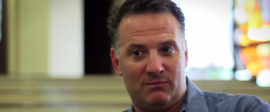Emotional Intelligence for Everyday Leadership
Blog / Produced by The High Calling
Some leaders seem to instinctively understand people: what motivates them, what frustrates them, what inspires them. Other leaders don’t. They are blind to the emotional landscape around them. These leaders lack what is commonly known as “emotional intelligence.” EI can be defined as “the ability to perceive, control, and evaluate emotions.” The concept has a long history, but was popularized in the 1990s by psychologists Peter Salovey, John D. Mayer, and Daniel Goleman.
The director of Seattle Pacific University’s Brain Center for Applied Learning Research, John Medina, Ph.D., prefers a more scientifically verifiable concept called Theory of Mind. He describes ToM as a gadget in the brain that allows a person to do two things: 1) peer inside someone else’s psychological interiors and understand the rewards and punishment systems inside those interiors; and 2) understand that the rewards and punishments that motivate that person are not same as the rewards and punishments that motivate oneself.
Medina says that having “terrific” ToM is what people mean when they talk about emotional intelligence. “If you’ve got really good Theory of Mind, you can make a terrific manager, because you can understand your emotional landscape all around you very, very quickly. If you have very poor Theory of Mind, you’re an emotional blunt instrument. You just bang around inside people’s hearts and make them mad and make them happy and inadvertently you do both and you have no idea how you do it, because it’s random, because you don’t see anything, because you’re an emotional idiot,” he said. (Note: This kind of forthright talk typifies the Medina Grump Factor, which is how Dr. Medina and others describe his commitment to rigorous scientific methodology.)
Whatever one calls the intuitive ability to read and respond well to others, nurturing this characteristic can help leaders create and foster cohesive, productive teams. After all what leader wants to be an “emotional idiot”?
Learning to Rightly Construe Emotions
“Emotional intelligence is about rightly construing what I’m doing emotionally, as well as rightly understanding and construing what you’re doing emotionally,” said therapist and author Terry Hargrave, Ph.D.
“What happens many times, because we come from a human resource perspective, is that we always have to be focused on behavioral objectives, and that would be fine if we were all just behavioral beings, but unfortunately we’re also communal and spiritual and emotional beings,” said Hargrave. “Our identity and safety needs play out in our everyday lives, whether that’s a work life, whether that’s a family life, or whether it’s the most intimate relationship that we have.”
He says it is “absolutely essential” for leaders to understand their own motivational needs and hot buttons because employees are “just as capable of hitting the boss’ buttons as the boss is of hitting theirs.” And leaders who feel disrespected or excluded because of employee behavior often become critical, withdrawing, over-controlling, or conflict-avoiding without ever acknowledging their feelings of having been disrespected or excluded. If they learn to assess their emotional landscape better, they can become less reactive and more proactive.
Hargrave advises leaders to be more aware of what they think other people are feeling. “Sometimes we get so connected to what we’re feeling about what they are doing that we lose track of having any empathetic or compassionate response to others,” he said.
“The secret to becoming more emotionally intelligent is to have a high degree of insight into yourself, which means you get your frontal lobe of your cerebral cortex functioning on understanding what’s happening with your emotions. In the psychological world, we call that mindfulness,” said Hargrave.
Unregulated emotions are much more powerful than cognition, he explained, but we can raise the level of our cognition to become more aware of emotions so that we can channel them in a positive direction.
The Apostle Paul talks about this concept throughout the New Testament, he said. Romans 12:2, for example, instructs us to be transformed by the renewing of our minds and Ephesians 4:22-24 tells us to take off the old self and put on the new by the renewing of the spirit of our minds.
“Neuropsychology tells us that it takes a lot of work to become aware and self-regulate yourself. If you just leave yourself to your own devices, you’re liable to be as emotionally reactive and uninsightful as ever,” he said.
A Deeper Understanding of the Golden Rule
The Rev. David Danielson, senior pastor of Impact Christian Fellowship in Kerrville, Texas, has been administering the DISC Personality Test to foster better relationships in churches and small groups since 1996. He says many organizations get big and then disappear because they treat people like commodities, whereas successful organizations create an environment in which people are valued for who they are, not just for what they can do or how they fit into the mechanisms of the organization.
He suggests starting from a place of understanding that “different is not wrong; different is just different” as a way to build relationship and trust within organizations. Eventually we may agree that not all perspectives are equally valid or useful, but thinking the best of others is a good place to start.
“It comes down to a deeper understanding of the golden rule,” he said. Treating others how we want to be treated works if they’re like us, but most people aren’t like us. In Danielson's opinion, Jesus was teaching his disciples to “be aware enough of who you’re dealing with to discern as quickly as possible how they want to be treated: Do they need information in advance? Do they like spontaneity? Do they need their space? Are they resistant to change?”
Likewise, he says that while self-control is a fruit of the Spirit, most people don’t know who their self is, so when they try to move in self-control, they end up trying to control things other than the self.
“We have to have a better awareness of our self, what makes us tick, our strengths, our weaknesses, our likes and dislikes,” said Danielson. Because none of us lives in a bubble, we also need to be aware of how the people around us are affected by our likes and dislikes, as well as by their own likes and dislikes.
“Once you experience being esteemed and respected and cared for for who you are, valued for who you are, I think that that’s the freedom that God created us to know and to experience,” he said.
Image by Geoff Ackling. Used with permission. Sourced via Flickr.










